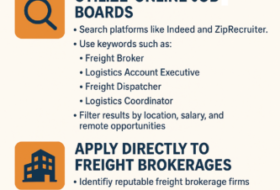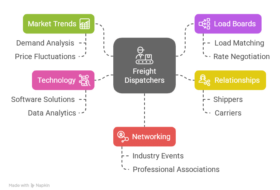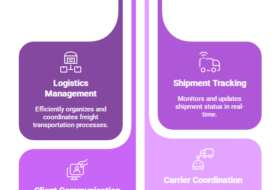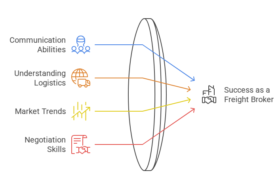Freight Broker License Requirements: Navigating the Path to Authorization
In the intricate world of logistics, obtaining a freight broker license opens the gateway to a dynamic career. Unveiling the Freight Broker License Requirements, this article takes you through the essential steps to gain the authorization you need to excel in the industry.
Understanding the Freight Broker License Requirements
Navigating the Regulatory Landscape
To operate as a freight broker, compliance with the regulatory framework is paramount. Understanding the specific requirements mandated by governing bodies ensures a smooth journey towards obtaining your license.
Meeting the Legal Criteria
Obtaining a freight broker license involves adhering to legal prerequisites. These often include:
- Age Requirement: Applicants must be at least 18 years old.
- Business Structure: Setting up a legal business entity is often mandatory.
- Proof of Insurance: Demonstrating insurance coverage is a key requirement.
- Financial Responsibility: Providing evidence of financial responsibility showcases your capability to handle transactions.
Educational Qualifications
Industry Knowledge
While formal education isn’t a mandatory prerequisite, having a strong grasp of the logistics industry is advantageous. Many successful freight brokers have backgrounds in logistics, business, or a related field.
Training Programs
Completing a reputable freight broker training program can bolster your knowledge and increase your chances of obtaining a license. Such programs cover critical aspects of the industry, from regulations to negotiation tactics.
Application Process
Obtaining an MC Number
To operate as a broker, you need to secure an MC (Motor Carrier) number from the Federal Motor Carrier Safety Administration (FMCSA). This is a fundamental step in the application process.
BMC-84 Bond or BMC-85 Trust Fund
To ensure financial responsibility, you’re required to obtain either a BMC-84 bond or a BMC-85 trust fund. This safeguards shippers and carriers in case of any payment disputes.
Unified Carrier Registration (UCR)
Registering with the UCR is essential for brokers operating in interstate commerce. It involves an annual fee that contributes to safety initiatives and infrastructure projects.
Operational Considerations
Surety Bond or Trust Fund
Your financial responsibility extends to maintaining a surety bond or trust fund throughout your operation. This ensures that you meet your financial obligations.
Recordkeeping
Maintaining accurate records of transactions, agreements, and communications is crucial. These records not only aid in your operations but also demonstrate your compliance in case of audits.
The Path to Success
Ethical Conduct
Adhering to ethical conduct and operating transparently instills trust among clients, carriers, and shippers. Your integrity plays a significant role in the success of your brokerage.
Continuous Learning
Staying updated with industry trends, regulations, and best practices is an ongoing journey. Continuous learning enhances your credibility and keeps you competitive.
Transitioning to a Fulfilling Career
As you navigate the realm of freight brokerage, understanding and fulfilling the Freight Broker License Requirements is essential. By meeting the legal criteria, obtaining the necessary bonds, and ensuring compliance, you pave the way for a thriving and sustainable career in logistics.
Unlock the potential within you. Become a licensed freight broker and embark on a journey filled with opportunities and success.







